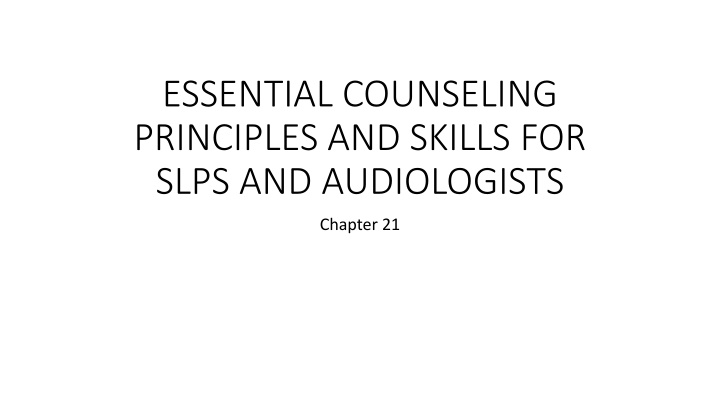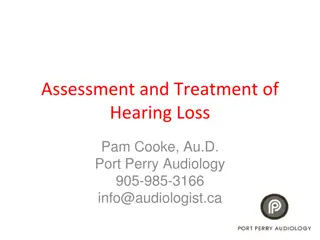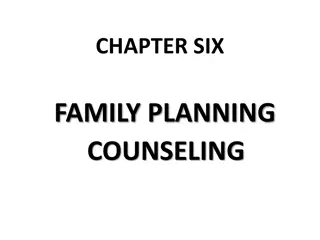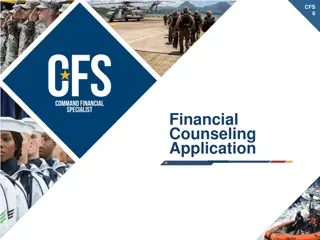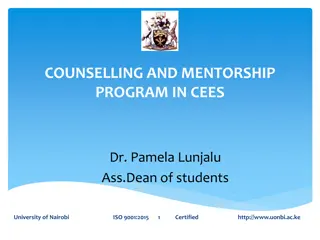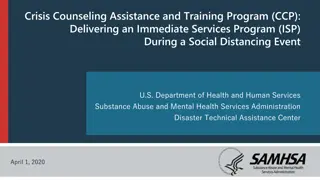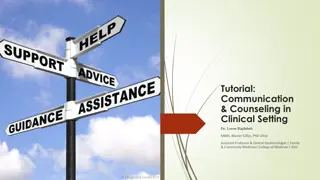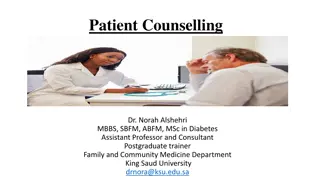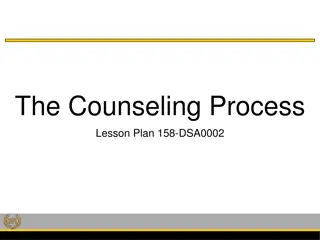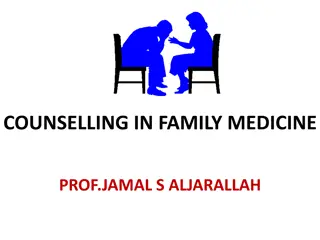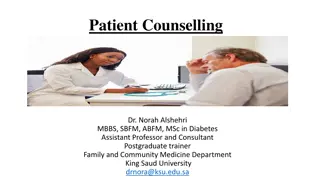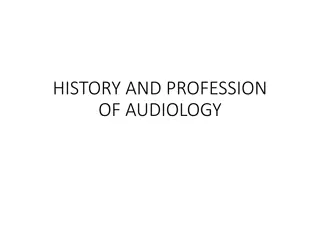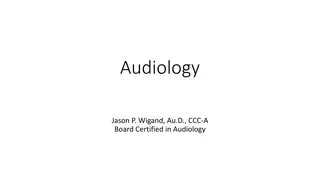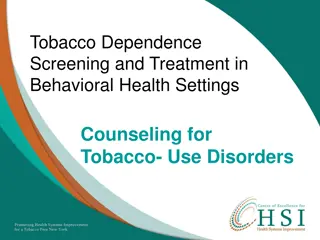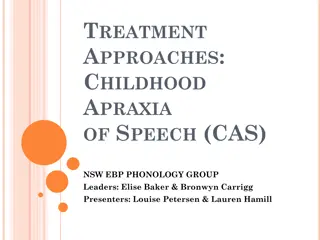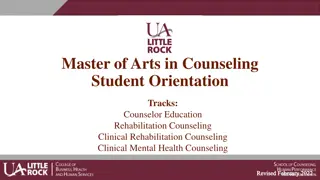Counseling Principles and Skills for SLPs and Audiologists
This chapter delves into essential counseling principles and skills for speech-language pathologists (SLPs) and audiologists. It emphasizes the importance of counseling in daily practice, addressing potential issues, boundaries, scope of practice, types of questions, and key qualities and skills for effective counseling. The content also covers helping clients change their thinking, managing reactions related to communication disorders, and normalizing experiences. Additionally, it highlights the role of SLPs and audiologists in educating clients, families, and communities about communication disorders and advocating for informed decisions. The chapter stresses the significance of building a positive first impression and provides insights into navigating counseling issues in clinical settings.
Download Presentation

Please find below an Image/Link to download the presentation.
The content on the website is provided AS IS for your information and personal use only. It may not be sold, licensed, or shared on other websites without obtaining consent from the author.If you encounter any issues during the download, it is possible that the publisher has removed the file from their server.
You are allowed to download the files provided on this website for personal or commercial use, subject to the condition that they are used lawfully. All files are the property of their respective owners.
The content on the website is provided AS IS for your information and personal use only. It may not be sold, licensed, or shared on other websites without obtaining consent from the author.
E N D
Presentation Transcript
ESSENTIAL COUNSELING PRINCIPLES AND SKILLS FOR SLPS AND AUDIOLOGISTS Chapter 21
Outline I. Introduction II. Potential Counseling Issues III. Boundaries and Scope of Practice IV. Types of Questions V. Personal Qualities of Effective Helpers VI. Foundational Counseling Skills VII. Helping Clients Change Their Thinking to Promote Change VIII. Reactions and Emotions Related to Communication Disorders IX. Normalizing X. Be Aware of Defense Mechanisms
I. INTRODUCTION** I don t do counseling. I am just an SLP/audiologist who treats speech, language, and hearing. My former students, especially in the hospitals: I thought the counseling class was just fluff. But counseling is what I do every day and I wish I d paid better attention.
Our job is to:** Refer people to other professionals when counseling needs fall outside of those related to communication and feeding/swallowing Educate the client and family and related community members about the communication disorder Help clients and families advocate for themselves make informed decisions
Remember** You don t have a second chance to make a good first impression Make sure that the first contact (phone, email, F2F) is warm, professional, and genuine
III. BOUNDARIES AND SCOPE OF PRACTICE** A. Within Our Boundaries Supporting family strengths to help them interact optimally with the client Encouraging the client and family to be independent
Within our boundaries (continued)** Interviewing the client and family Presenting the diagnosis of a communication disorder Working with the patient s and family s reaction to the diagnosis Making treatment recommendations and suggestions for family carryover at home
B. Outside our BoundariesRefer to Appropriate Professionals
IV. TYPES OF QUESTIONS** Closed questions usually at beginning of the interview (Where do you work? How many people are in your family?) there is a specific answer Open-ended questions don t elicit a specific response. You shared that you don t wear your hearing aid much. How do you feel about that?
V. PERSONAL QUALITIES OF EFFECTIVE HELPERS** 1. Has unconditional positive regard for the client be respectful, accepting, and nonjudgmental (may be challenging if they are quite different from us) 2. Shows empathetic understanding grasping the client s subjective perspective 3. Flexibility
Personal qualities of effective helpers continued:** 3. Is congruent genuine in touch with their own feelings Words and body language match An example of incongruence: smiling as we tell someone we are sorry that they had a car accident and now have TBI
Reflection: Write down 3 ways that you can take care of yourself so you will be at your best for your clients. Provide 1 sentence of explanation about each one. For example: exercise, going to church
VI. FOUNDATIONAL COUNSELING SKILLS** Focusing active listening Self awareness Gathering information Providing information Promoting change
VII. HELPING CLIENTS CHANGE THEIR THINKING TO PROMOTE CHANGE** The cognitive-behavioral theory of Albert Ellis focuses on the fact that our thoughts are key to our feelings The key is the meaning that we attach to an event For example, I stutter so I can t attract a loving partner and will be lonely for my whole life. Because of my hearing loss, I can t go to parties and have fun any more.
Our job as clinicians is to help clients identify distorted thoughts with \ newer and more rational thoughts that lead to behavioral changes
I cant go to parties and have fun any more because of my hearing loss ** 1) help the client explore their thinking So it s hard to hear at noisy parties. Does this mean you can t have a conversation with anyone? 2) Challenge the client to test the validity of their belief through experimentation Next time you go to a party, see if you can find a quiet corner and talk to someone.
3) Create a change in thinking through analyzing the** data gathered through experimentation. What happened at the party? Client: I actually met a really nice person and we talked for quite a while. 4) Create a change in the behavior based on the new positive evidence. So you can go to parties and have fun. You just have to find quiet spaces where you can hear the other person well.
VIII. REACTIONS AND EMOTIONS RELATED TO COMMUNICATION DISORDERS
Do not say** I understand just how you feel __ is a survivor. They will come out of this better than ever. I m sure some good will come out of this
Outline I. Introduction II. Potential Counseling Issues III. Boundaries and Scope of Practice IV. Types of Questions V. Personal Qualities of Effective Helpers VI. Foundational Counseling Skills VII. Helping Clients Change Their Thinking to Promote Change VIII. Reactions and Emotions Related to Communication Disorders IX. Normalizing X. Be Aware of Defense Mechanisms
